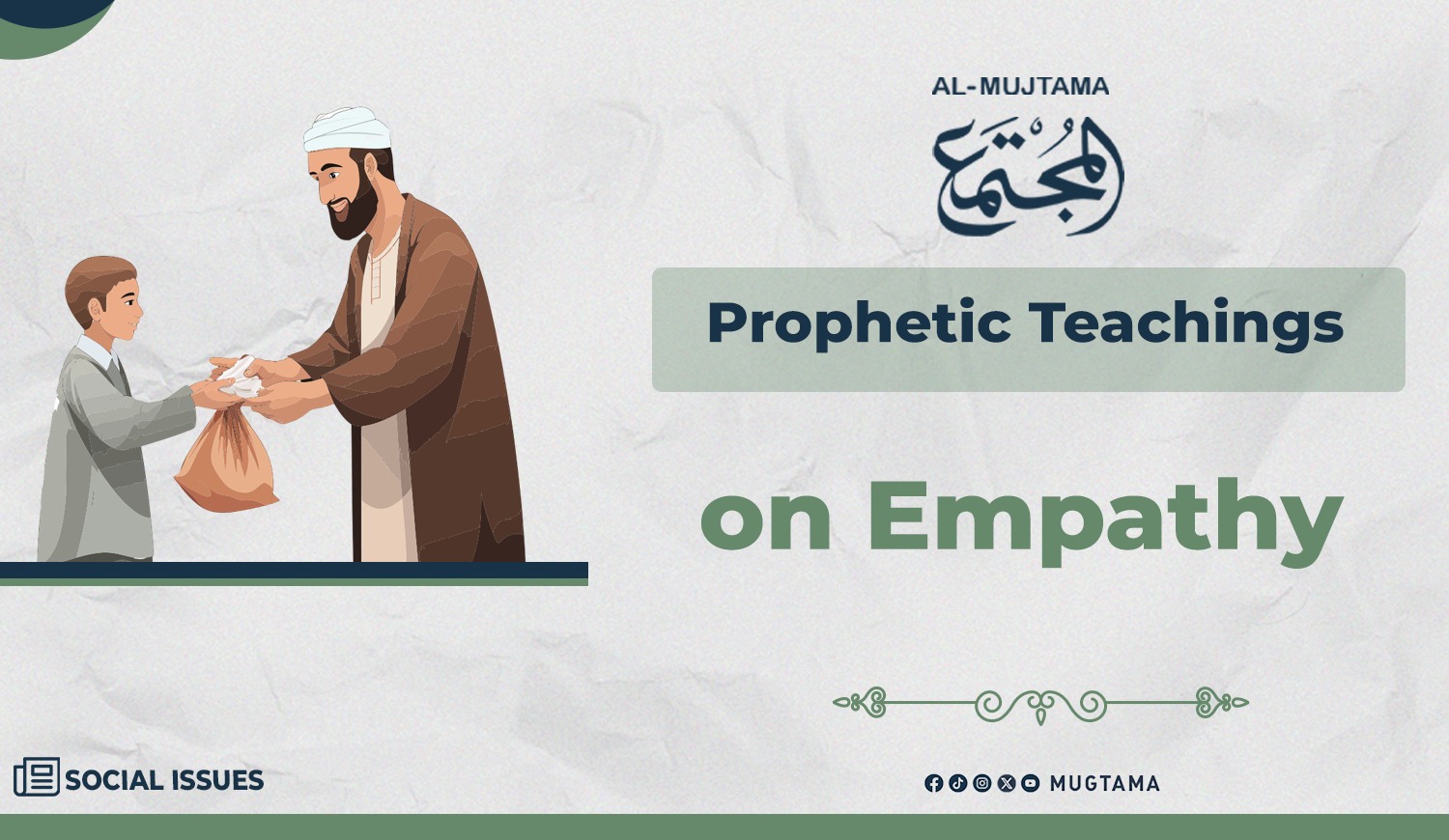5 Prophetic Examples of Empathy Toward Others

People often seek empathy from others, as
it is a trait of cohesion and cooperation that distinguishes a sound person—one
who is capable of offering help and support to those around them.
Empathy manifests in many diverse forms: it
could be through a word, a sincere hug, a material gift, or an act of
assistance that helps the other person improve or feel more positive emotions.
A person who is more empathetic toward
others is often beloved, sociable, influential, and even a natural leader. At
the same time, such individuals are rare and valuable.
To belong to this group or to attain this
noble trait, one must become familiar with the various forms of empathy
available to them. We remind you of some of these:
First: Remember that the
Prophet ﷺ encouraged empathy and compassion, making it a trait of
believers. He said: “You see the believers as regards their being merciful
among themselves and showing love among themselves and being kind, resembling
one body, so that, if any part of the body is not well then the whole body
shares the sleeplessness (insomnia) and fever with it.” (Reported
by al-Bukhari)
This quality is not just for individuals
but for the entire Muslim community. If a calamity or crisis befalls a certain
nation, it becomes incumbent upon all Muslim lands to rush to its aid and offer
help and support. If a people are afflicted by war or a pandemic, such as what
is happening in Gaza, then Muslim nations must hasten to unite and cooperate to
alleviate their suffering.
Second: A Muslim should give
charity from what exceeds their needs or what they are able to share with
others, as the Prophet ﷺ said: “He who has an extra mount should lend it to him who has
none, and he who has extra provision should give it to him who has none.” (Reported
by Muslim)
So whatever exceeds the Muslim's own
need—whether food, drink, transport, or other possessions—must be given in
charity. This is an act of altruism and empathy with those who lack, and it
cultivates love and harmony within the Muslim community and strengthens its
cohesion and mutual support.
Third: Among the forms of
empathy is sponsoring an orphan, caring for them, supporting them both
emotionally and materially, and making up for their loss. The Prophet ﷺ said: “I and the one
who looks after an orphan will be like this in Paradise,” and he
pointed with his index and middle fingers (Reported by al-Bukhari).
Another example is gently patting the
orphan’s head, which softens the heart. Abu Huraira narrated that a man
complained to the Messenger of Allah ﷺ about the
hardness of his heart. The Prophet ﷺ told him: “If you want
your heart to be softened, feed the poor and pat the head of the orphan.” (Reported
by Ahmad and authenticated by al-Albani)
Fourth: Your empathy toward
others can take many shapes, depending on your capacity and ability. It does
not have to be material support; simply standing beside someone in a time of
difficulty, helping them with an errand, or bringing happiness to their heart—all
these count. The Prophet ﷺ said: “The most beloved people to Allah are those who are most
beneficial to others, and the most beloved deeds to Allah are bringing
happiness to a Muslim or removing a distress from him, settling his debt or
relieving his hunger. And I would prefer to walk with my brother in fulfilling
his need over secluding myself in this mosque (referring to the mosque in
Madinah) for a month. Whoever restrains his anger, Allah will cover his faults,
and whoever suppresses his rage even though he could fulfill it, Allah will
fill his heart with hope on the Day of Judgment. And whoever walks with his
brother in fulfilling his need until he secures it, Allah will make his footing
firm on the Day when feet will slip.” (Reported by al-Ṭabarāni)
Fifth: Understanding the
emotions of others and apologizing when one is wrong are invaluable forms of
empathy, especially in critical moments. The ability to sense others' emotions,
feel their suffering, and imagine oneself in their situation is part of emotional
and psychological empathy. Expressing understanding to someone in crisis is
enough to uplift them emotionally, reassure them that mistakes happen, and
remind them that the door of repentance is always open. Asking about them and
checking on their condition are forms of empathy that people often neglect, yet
they can have a profound effect.
We have in the Messenger of Allah ﷺ the best
example. Observe how he treated Abdullah ibn Umm Maktum after Allah had
admonished him regarding him. Whenever he would meet him, he would say: “Welcome
to the one for whom my Lord admonished me. Do you need anything?”
-------------------------------------------------------------










